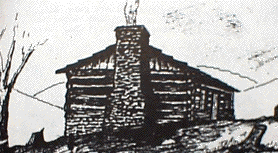-
The following story is from Brent Mount, published in
1989 by Eden Industries, Dallas, TX and is used with his kind permission.
 "Samuel Mount, son of Richard and Rebecca ______ Mount was born in 1724 and died Aug 7, 1801 at the age of 77 years. He married, by license dated June 20, 1755 to Frances, a sister of Nathaniel and daughter of Abiel Cook, born Sept 16, 1731, and died Sept 16, 1806. They lived first at Upper Freehold, New Jersey, but moved about 1772 to the Mohawk Valley of New York where he received a land grant on the Jerseyfield patent. This was a block of land
which was established in 1772 for settlement and upon which many from New Jersey came to live.
"Samuel Mount, son of Richard and Rebecca ______ Mount was born in 1724 and died Aug 7, 1801 at the age of 77 years. He married, by license dated June 20, 1755 to Frances, a sister of Nathaniel and daughter of Abiel Cook, born Sept 16, 1731, and died Sept 16, 1806. They lived first at Upper Freehold, New Jersey, but moved about 1772 to the Mohawk Valley of New York where he received a land grant on the Jerseyfield patent. This was a block of land
which was established in 1772 for settlement and upon which many from New Jersey came to live.
Samuel's land was just north of Salisbury, New York. This work describes the account of the people of that area and in particular that of Samuel Mount's family in the early days of the American Revolution."
"In this account, the scalping of the two young sons of Samuel by the Indians for the reward paid by the British is told. It states that as the hostilities began, during the Revolution, the settlers, left the "valley" one by one, leaving Samuel Mount and his family alone. Since the Mounts had always treated the Indians kindly, they had no fear of them. However, with the equivalent of 8 dollars a head for American scalps, the Indians began to raid isolated families still left in the area. On one occasion, Samuel took his family to the nearby town of Salisbury, apparently to the mill, and left three of his sons at home alone with a young black boy. Of these sons, Richard
Aaron and Timothy were left in the barn to thrash peas, while Samuel Jr. was in a far field with his chores. Two Indians approached the barn and asked for milk to drink. According to the young black boy, Richard and Timothy told them, truthfully, that they had none. Using this as an excuse, the two Indians took out their tomahawks and scalped the two young sons of Samuel. The black youth was spared as the British only paid for white scalps".
"The details of the Indian incident was written into a novel "Drums Along the
Mohawk, by Alexander Edmondson, and in the 1940 period was made into a movie."
"After the death of the two young sons, Samuel moved his family to Trenton,
New Jersey."
Additional Information on the Setting
The purpose of this exercise is to place what happened to the family of Samuel Mount into a historical context and a number of aspects will be addressed.